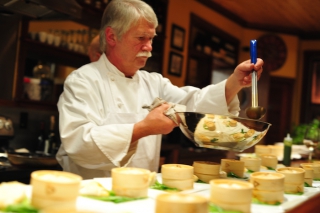
Think Tank: It’s All About Value
27 April 2016“Price (for education) is what you pay. Value is what you get.” -Warren Buffett
By Paul Sorgule, MS, AAC
Deans and directors, more than anyone else within the culinary education model, know there is an important business side to what they do. In most cases, culinary programs are enrollment driven. The cost of delivering a culinary education with expensive and program specific facilities, lower than normal faculty-to-student ratios, and the supplies necessary in kitchens and practice restaurants drives the need to constantly seek ways to maximize enrollment while still maintaining high standards at the entry point.
What makes this part of a dean or director’s job even more challenging is a field of significant competitors an increasing price sensitivity to rising tuition and stretched scholarship funds. So, with all of these challenges – how can a program identify and recruit the right student, with the right attitude and work ethnic, and a passion for a career in food?
Regardless of your size and scope, the answer always falls back to the perceived and real value derived from participation in your program. Your marketing, brand, and success depend on the value that you create for students, faculty, and the industry that will help support your goals.
What does value look like in a culinary arts program? First, and foremost, it is important to look at the end result and work backward. Where are your graduates working? How successful are they a few years out? How confident are your graduates after they walk across the commencement stage? The integrity, rigor, and relentless pursuit of your curriculum’s excellence are by far the most significant component of value. However, value is also measured in the unique attributes of your program that help create an exciting, dynamic, and forward thinking graduate. Many refer to these components as the “life-changing” piece to your value formula.
As a dean or director, it is your responsibility to look for, help create, and facilitate these unique attributes. Look at your current program and ask: “What sets us apart?” Digging deeper, ask your current students and alumni to define what life-changing components of your program make them proud to say they are associated with the school? Without these pieces of differentiation, your program, as solid as it might be, can easily be viewed as a commodity. There are, after all, many programs that provide a solid curriculum, delivered by experienced and dedicated faculty. Without those unique value components potential students could easily look at your program as being on an equal playing field with many others. Why should the right student choose you?
Here are some thoughts that many have contemplated, but few have pulled off exceptionally well:
- A Real Overseas Culinary Experience: Sure it’s difficult, but look for the right partnership that will allow students to actually work in restaurants and vineyards rather than focus strictly on classes in a shared experience institution.
- Back to the Earth: Many schools talk about their focus on the farm-to-table movement, but few actually connect with farmers and have students experience what it’s like to plant, cultivate, and harvest a crop.
- Create Real-world Restaurant Experiences: There is a time and a place for highly-controlled practice restaurant experiences where numbers are predictable, menus are small, and three times as many student cooks as is realistic are responsible for cooking and plating. Those schools that actually immerse students (when they are ready) in real restaurant environments that are fast paced, unpredictable, and unforgiving are the ones that graduate “kitchen ready” individuals.
- Push Students to Excel: Foodservice is an industry that often is less forgiving than we might like. Students who are confident in their abilities are the ones who were constantly pushed to improve every day. Create an environment of honest critique with support that demonstrates how to improve, hold students to the same standards of expectation that their future employers will, and you will be amazed at how well they adapt. This is value creation.
- Special Events are Magical: Students are attracted to and remember school programs that provide them with opportunities that they might never find unless they became a part of that institution. Seek them out, make sure that you have some control over the experience, and energize your students to work on events such as galas, festivals, sporting events, conference meals, and unique cater outs that many restaurants would shy away from. These events build stamina, show students what is possible, teach them how to be resilient, and provide memories that will never be forgotten.
- Create School Pride: Every successful culinary program creates positive school spirit through the formation, training, and support of culinary competition teams. If your program fails to present student cold food, hot food, and knowledge bowl teams, then where will that school spirit come from?
- Treat Everyone the Same and Everyone Differently: The value programs are the ones where faculty and administrators build and enforce expected standards of excellence, but seek to know each student as an individual and focus on ways to help each person reach those standards. Leave no student behind. If a student meets your requirements for entrance then it should mean that you trust that they have the potential to be successful. Value programs never let those students down.
Take a new approach toward building a sustainable program that goes beyond a student’s first reaction to price and competition by understanding this simple quote:
“Price (for education) is what you pay. Value is what you get.” -Warren Buffett
It’s all about value.
Paul Sorgule, MS, AAC, president of Harvest America Ventures, a mobile restaurant incubator based in Saranac Lake, N.Y., is the former vice president of New England Culinary Institute and a former dean at Paul Smith’s College. Contact him at This email address is being protected from spambots. You need JavaScript enabled to view it..
